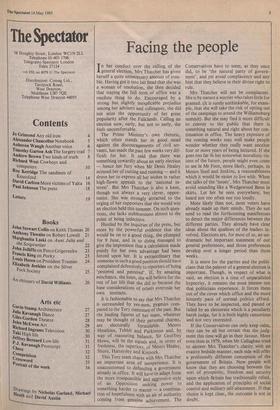Facing the people
In her conduct over the calling of the general election, Mrs Thatcher has given herself a quite unnecessary amount of trou- ble. Having got it into her head that she was a woman of resolution, she then decided that staying the full term of office was a resolute thing to do. Encouraged by a strong but slightly inexplicable prejudice among her advisers and colleagues, she did not seize the opportunity of her great popularity after the Falklands. Calling an election now, early, but not so early, she feels uncomfortable.
The Prime Minister's own rhetoric, which often stands her in good stead against the discouragements of civil ser- vants, has made the past few weeks very dif- ficult for her. It said that there was something cowardly about an early election — hence her fury when Mr Denis Healey accused her of cutting and running — and it drove her to express all her wishes in rather high-flown appeals to the 'national in- terest'. But Mrs Thatcher is also a keen, though not always a very clever, oppor- tunist. She was strongly attracted to the urging of her supporters that she would win an election held this summer. On such ques- tions, she lacks stubbornness almost to the point of being indecisive.
Hustled by the inquiries of the press, but more by the powerful evidence that she would be on to a good thing, she plumped for 9 June, and in so doing managed to give the impression that a calculation made purely for her own advantage had been forced upon her. It is extraordinary that someone in such a good position should have complained defensively to reporters of being 'pestered and pestered'. If, by amazing mischance, she loses, she will believe for the rest of her life that she did so because the base considerations of others overrode her own instincts.
It is fashionable to say that Mrs Thatcher is surrounded by yes-men, pygmies com- pared to the Tory statesmen of the past. But the leading figures of her team, whatever may be thought of their personal charms, are electorally formidable. Messrs
Heseltine, Tebbit and Parkinson and, by way of reassuring balance, Sir Geoffrey Howe, will be the equals and, in terms of freshness, the superiors, of Messrs Healey, Shore, Hattersley and Kinnock.
This Tory team shares with Mrs Thatcher an important area of inexperience. It is unaccustomed to defending a government already in office. It will have to adapt from the more irresponsible and aggressive style
of an Opposition seeking Power to something harder to master — a combina- tion of hopefulness with an air of authority coming from genuine achievement. The
Conservatives have to seem, as they once did, to be 'the natural party of govern- ment', and yet avoid complacency and any hint that they believe in their divine right to rule.
Mrs Thatcher will not be complacent. She is by nature a worrier who takes little for granted. (It is surely unthinkable, for exam- ple, that she will take the risk of opting out of the campaign to attend the Williamsburg summit). But she may find it more difficult to convey to the public that there is something natural and right about her con- tinuation in office. The heavy exposure of the coming weeks may well make people wonder whether they really want another four or more years of being lectured. If she goes too far in her somewhat moralistic vis- ions of the future, people might even come to see in Mr Foot, more likely, perhaps, in Messrs Steel and Jenkins, a reasonableness which it would be easier to live with. When she talks of the 'issues', Mrs Thatcher must avoid sounding like a Wedgewood Benn in skirts. Let her be seen everywhere, but heard not too often nor too loudly.
More likely than not, most voters have already made up their minds. They do not need to read the forthcoming manifestoes to detect the major differences between the different parties. They already have clear ideas about the qualities of the leaders in- volved. Elections are, for most of us, an un- dramatic but important statement of our general preferences, and those preferences develop over a longer period than three weeks.
It is more for the parties and the politi- cians that the palaver of a general election is important. Though, in respect of what is said, an election is a time of unparalleled hypocrisy, it remains the most intense test that politicians experience. It forces them out of the cover which office and the more leisurely pace of normal politics afford. They have to be inspected, and passed or failed by an electorate which is a peculiarly harsh judge, for it is both highly censorious and not very interested.
If the Conservatives can only keep calm, they can be all but certain that the judg- ment this time will go in their favour. More even than in 1979, when Mr Callaghan tried to answer Mrs Thatcher's clarity with an evasive bedside manner, each side will offer a profoundly different conception of the government of Britain. Now people will know that they are choosing between the sort of prosperity, freedom and security upon which Britain has traditionally relied, and the application of principles of social control and military self-abasement. If that choice is kept clear, the outcome is not in doubt.










































 Previous page
Previous page